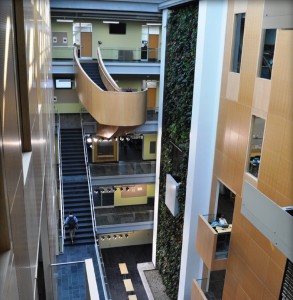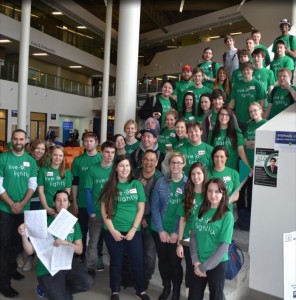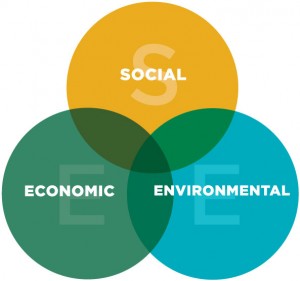A Primer on Sustainability at Algonquin College
Towards a Sustainable Algonquin College
Algonquin College is reaffirming its commitment to embedding sustainability in our teaching, in our decisions as well as in our operations. This inspiring journey will call on all of us to work together toward this goal, each of us in ways relevant to our daily activities. And it unites us with countless other organizations, governments and individuals who are taking responsibility for the social, environmental and economic wellbeing of our world.
Algonquin’s Commitment to Sustainability
The 1987 report of the Brundtland Commission, Our Common Future, presented a now widely-accepted definition of what sustainability means:
“Sustainable development is development that meets the needs of the present without compromising the ability of future generations to meet their own needs.”
This definition has been adopted globally across the entire spectrum of human activities. Among post-secondary educational institutions, the task of translating it into practice has been led by groups such as the Association of University Leaders for a Sustainable Future (AULSF) and the Association for Community Colleges of Canada (ACCC).
Algonquin has fully embraced sustainability. In 2007, we became the first college in Canada to sign the Talloires Declaration, an international agreement between postsecondary officials for advancing sustainability through teaching, research, operations and outreach. We’ve also signed onto the ACCC Pan- Canadian Protocol for Sustainability. The commitments embodied in these agreements are ambitious, and each of us at Algonquin has a part to play in helping our community live up to them.
Setting the Course: Our Sustainability Strategy Framework
The Sustainable Algonquin Steering Committee (SASC) undertook an extensive and inclusive process involving members of our community as well as outside experts and partners to determine how to apply the Social-Economic-Environmental model within the College community. The result of this comprehensive examination is a Sustainability Strategy Framework that will guide our collective efforts and help each of us see where our own contributions can make a difference. It will shape practices and decisions related to College affairs and our curriculum by laying out nine goals across three pillars of sustainability: social, economic and environmental.
While it’s common to think of sustainability as a matter of environmental initiatives (e.g. ‘going green’, reducing ecological footprints or lowering greenhouse gas (GHG) emissions), meeting present and future human needs involves a much larger spectrum of considerations. Algonquin’s approach to sustainability encompasses an equal weighing of economic and social as well as environmental dimensions. The three spheres of sustainability are interdependent, flourishing only if kept in balance —just as with a three-legged stool that stays upright only when each individual pillar is strong.
Other Popular Models of Sustainability:
- triple bottom line;
- people, planet and profits;
- human, natural and financial capital;
- the three E’s of economy, ecology and equity.
Algonquin’s Role in a Global Green Economy

Organizations globally and across Canada are embracing sustainability as a strategy that drives better business performance, innovation, new employment opportunities, greater social equity and a healthy planet. Businesses are quickly adopting Corporate Social Responsibility (CSR) strategies, and countless institutions and industries are taking steps to mitigate risks associated with climate change, resource conservation, supply chains and social impacts. Sustainability is now part of most – if not all – primary and secondary education curriculum across the country.
At Algonquin, we provide a post-secondary education aimed at shaping global citizens capable of working toward a better future for all. By embedding sustainability in all areas of the College, we aim to empower graduates with a broad perspective and deep understanding of our collective and individual impacts on local and global communities. We know that operating sustainably will yield immediate benefits in the form of greater efficiencies and improved ways of working. But we also believe this approach will better prepare our students for satisfying and meaningful employment.
Building a Sustainable Algonquin Together
Everyone at Algonquin has a shared responsibility in realizing sustainability. External stakeholders will contribute guidance and inspiration, while our administration, staff and faculty will act as change agents in areas of curriculum, operations and planning. Our students’ enthusiasm and ideas will provide inspiration and leadership and hold us to high standards in collectively delivering on our promises. On campus and within the community, our students and graduates serve as ambassadors of a Sustainable Algonquin.

This isn’t about a revolution in what we do at Algonquin—it’s about different and better ways of making decisions as we carry out our individual activities. Tools such as business models, action plans and performance measures will help integrate sustainability goals into to our operations. As we all come to learn in more depth what sustainability means as an ideal and in the context of our own roles , we’ll each become accountable for our own path while embracing a process of continuous improvement, learning from best practices, and innovating. Throughout the process of integrating sustainability into all that we do, measurement of our success will evolve and increase in sophistication.
This initiative is an opportunity for Algonquin College to exercise its long-standing strengths in innovation and leadership. Already we have major initiatives in place: LEED® Gold for new buildings, our Energy Savings Contracts and Vocational Learning Outcome (VLO), to name just a few. As we build on these starting points, case studies on gains made and lessons learned will highlight achievements and provide guidance. The Sustainable Algonquin Steering Committee will provide leadership, prioritize resources and support the development of tools and grassroots initiatives to help organizational groups formalize their commitments to achieving sustainability through their policies and practices.
An invitation to join in the journey
The collective efforts towards a Sustainable Algonquin showcase the College at its best – adapting, responding, and innovating. With our pathway set, and with all members of the Algonquin community working together, each of us contributing in ways most relevant to our own roles, we’ll achieve results we can all be proud of.
